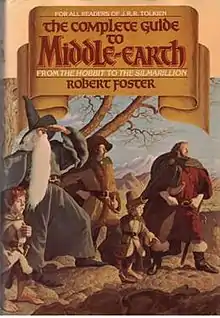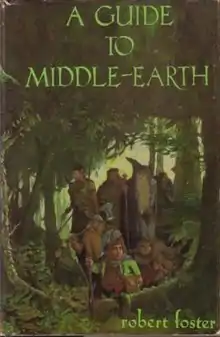The Complete Guide to Middle-earth
The Complete Guide to Middle-earth: from The Hobbit to The Silmarillion is a reference book for the fictional universe called Middle-earth of J. R. R. Tolkien's legendarium, compiled and edited by Robert Foster.
 Dust jacket of 1978 edition | |
| Author | Robert Foster |
|---|---|
| Cover artist | The Brothers Hildebrandt |
| Country | United States |
| Language | English |
| Subject | Tolkien's legendarium |
| Genre | Reference |
| Publisher | Ballantine Books |
Publication date | 1978 |
| Media type | Print (Hardback & Paperback) |
| Pages | 573 pp |
| ISBN | 0-345-44976-2 (2001 edition) |
| OCLC | 48541956 |
| Preceded by | A Guide to Middle-earth, Mirage Press, 1971 |
Context
Robert Foster (b. 1949, Brooklyn) earned a Ph.D. in English and Medieval Studies at the University of Pennsylvania, and taught subsequently in the English Department at Rutgers University.[1][2]
Guide
The Complete Guide to Middle-earth is a major expansion of Foster's A Guide to Middle-earth, which was published in a limited edition by Mirage Press in 1971. Almost twice the length of the original (573 vs. 292 pages), the 1978 version incorporates extensive entries related to The Silmarillion (1977). A further revised edition (ISBN 0-345-44976-2) was published in 2001, in time for Peter Jackson's The Lord of the Rings film trilogy.
The Complete Guide to Middle-earth is widely recognised as an excellent reference book on Middle-earth.[3] Christopher Tolkien has commended it himself as an "admirable work of reference".[4]
However, as it does not include information on post-Silmarillion material (i.e. Unfinished Tales and the series The History of Middle-earth), the 1978 edition contains some assertions contradicted by later publications. For example, the Star of Elendil jewel (Elendilmir) is identified with the Star of the Dúnedain given to Samwise Gamgee, but Christopher Tolkien refutes this.[5] It also includes speculation on matters later confirmed in subsequent works. For example, Foster proposes that Gandalf and Olórin are one and the same – confirmed in Unfinished Tales.
A German edition, Das Große Mittelerde-Lexikon, revised and translated by Helmut W. Pesch, was published in 2002.[6]
A Guide to Middle-earth
 Front of wrap-around dust jacket | |
| Author | Robert Foster |
|---|---|
| Cover artist | Tim Kirk |
| Country | United States |
| Language | English |
| Subject | Tolkien's legendarium |
| Genre | Reference |
| Published | 1971 (Mirage Press, Baltimore, Maryland) |
| Media type | Hardcover and Paperback |
| Pages | 292 |
| Followed by | The Complete Guide to Middle-earth (revised and expanded edition) |
A Guide to Middle-earth was the first published encyclopedic reference book for the fictional universe of J. R. R. Tolkien's Middle-earth, compiled and edited by Robert Foster. The book was published in 1971 by Mirage Press, a specialist science fiction and fantasy publisher, in a limited edition of 2000 copies (750 numbered hardcovers and 1250 unnumbered paperbacks). A paperback edition was issued by Ballantine Books in 1974.[7]
The author profile in the first edition describes Robert Foster as the then-"Tengwar Consultant" to the Tolkien Society of America. The book incorporates material previously published in the science fiction fanzine Niekas.
Lester del Rey praised the 1971 version for covering "literally everything you wanted to know about Middle Earth and were unable to discover before."[8]
References
- "Robert Foster". Alibris. Retrieved 15 January 2013.
- "Robert Foster Complete Guide to Middle Earth". Library of Congress. Retrieved 15 January 2013.
- Drout 2006, p. xxix (editor's introduction, which refers to the book by the title of the 1971 edition.
- Tolkien 1998, p. 6 (editor's introduction) "If I have been inadequate in explanation or unintentionally obscure, Mr Robert Foster's Complete Guide to Middle-earth supplies, as I have found through frequent use, an admirable work of reference.".
- Tolkien 1998, Footnote 8 in 'Many Roads Lead Eastward (1)', p. 309.
- Drout 2006, p. 240.
- Drout 2006, pp. 655-656.
- del Rey, Lester (1974). "Reading Room". If (September 1974): 132.
Sources
- Drout, Michael (2006). J. R. R. Tolkien Encyclopedia. Routledge. ISBN 0-415-96942-5.
- Tolkien, J. R. R. (1998). Unfinished Tales. HarperCollins. ISBN 0-261-10362-8.